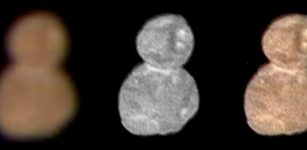Tabby’s Star: New Explanation On Strange Dimming Behavior
Eddie Gonzales Jr. – MessageToEagle.com – Astronomers at Columbia University have developed a possible explanation for an oddity regarding the strange dimming behavior of Tabby’s Star.
First identified more than a century ago, the star dips in brightness over days or weeks before recovering to its previous luminosity. At the same time, the star appears to be slowly losing its luster overall, leaving researchers scratching their heads.
 A new study suggests that chunks of an exomoon’s dusty outer layers of ice, gas, and carbonaceous rock may be accumulating in a disk surrounding Tabby’s Star, blocking the star’s light and making it appear to gradually fade. (Photo: NASA/JPL-Caltech)
A new study suggests that chunks of an exomoon’s dusty outer layers of ice, gas, and carbonaceous rock may be accumulating in a disk surrounding Tabby’s Star, blocking the star’s light and making it appear to gradually fade. (Photo: NASA/JPL-Caltech)
Researchers propose that the long-term dimming is the result of a disk of debris—torn from a melting exomoon—that is accumulating and orbiting the star, blocking its light as the material passes between the star and Earth.
“The exomoon is like a comet of ice that is evaporating and spewing off these rocks into space,” astrophysicist Brian Metzger, associate professor of astrophysics at Columbia University and principal investigator on the study, said in a press release.
“Eventually the exomoon will completely evaporate, but it will take millions of years for the moon to be melted and consumed by the star. We’re so lucky to see this evaporation event happen.”
Tabby’s Star, also known as KIC 8462852 or Boyajian’s Star, is named after Tabetha Boyajian, the Louisiana State University (LSU) astrophysicist who discovered the star’s unusual dimming behavior in 2015. Boyajian found that Tabby’s Star occasionally dips in brightness—sometimes by just 1 percent and other times by as much as 22 percent – over days or weeks before recovering its luster.
In this study, the Columbia team suggests that chunks of an exomoon’s dusty outer layers of ice, gas, and carbonaceous rock may be accumulating in a disk surrounding Tabby’s Star, blocking the star’s light and making it appear to gradually fade.
The next step for the researchers is finding other stars like Tabby’s that have abducted exomoons and have not yet finished annihilating them.
If the team’s explanation is correct, it indicates that moons are a common feature of exoplanetary systems, thereby providing a way to probe the existence of exomoons.
Written by Eddie Gonzales Jr. – MessageToEagle.com Staff










